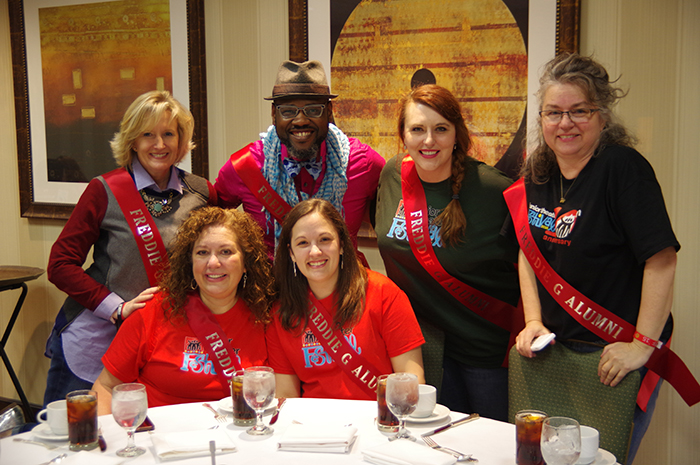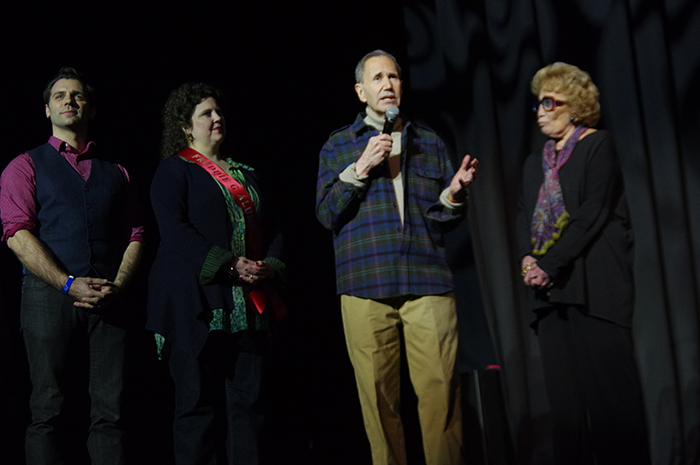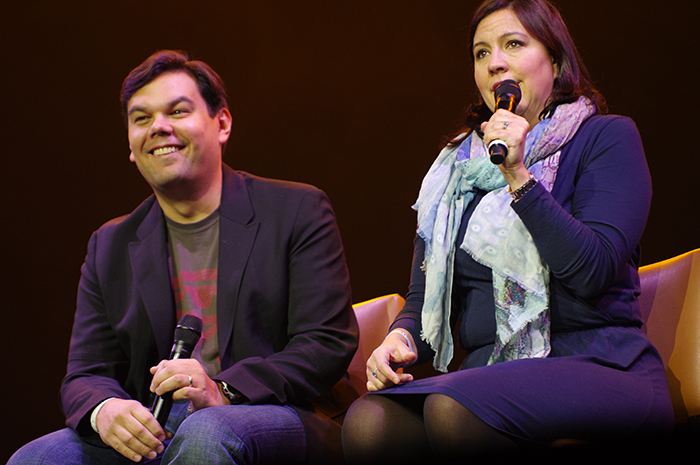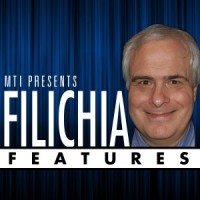Filichia Features: Junior Theater Festival is a Perfect 10 (Part 2)
Filichia Features: Junior Theater Festival is a Perfect 10 (Part 2)
 While there’s been plenty of singing and dancing at Junior Theater Festival in Atlanta, now it’s time for a ton of talk.
While there’s been plenty of singing and dancing at Junior Theater Festival in Atlanta, now it’s time for a ton of talk.
For after Saturday morning’s presentations of kids performing various Jr. musicals (and an all-too-quick lunch), learned teachers will now learn more at workshops.
Many of their shirts and blouses are bisected by red sashes worthy of European monarchs. These celebrate the teachers who in previous years were chosen for The Freddie G Experience -- a prize worthy of a prime-time game show.
It’s named for Freddie Gershon, the CEO of Music Theatre International. Actually, Gershon should be giving workshops to make people aware of the importance of teachers. If everyone treated teachers with the respect that he has for them, we’d have a much better world with much happier teachers and much smarter students.
Each year, Gershon flies eight teachers to New York, where they stay in a fine hotel, attend lectures and workshops headed by Tony-recognized pros, see some hit Broadway shows and get a sumptuous farewell dinner – not to mention memories for a lifetime.
One Freddie G awardee is Tessa Derfner, who undoubtedly has a suite in heaven reserved for her as a result of all she’s accomplished at P94M, a New York City S.P.E.C.T.R.U.M. school. That stands for Special Populations Educated Creatively through Rigor, Understanding and Motivation. Kids with autism, Down Syndrome or other special needs attend and, with teachers as skilled and devoted as Derfner, greatly profit from it.
While Derfner always had a passion for theater, she opted to be a special education teacher. And yet, soon after she arrived at P94M, she was offered the chance to stage shows with the kids. That prompted her to go grant-hunting, which led to her getting a Shubert/MTI/NYCDOE Broadway Jr. Grant.
“Everyone thought I was crazy to do ANNIE JR.,” she says, “but it worked.”
Last year she upped the ante by bringing students to Junior Theater Festival where they performed the Aladdin Kids edition. “Most of these kids had never flown in a plane or had even stayed in a hotel,” says Derfner with a smile that shows how happy she is to have brought them into, as an Aladdin song goes, “A Whole New World.”Filmmaker Danny Mendoza captured P94M’s journey from casting to performing in Atlanta in his documentary “Spectrum of Hope.” Its screening here on Friday night proved to be an extraordinary kickoff for the festival. The film showed that Mendoza, music director Scott Evan Davis and principal Ronnie Shuster also deserve heavenly suites next to Derfner (which we all hope none will need for decades upon decades).
Too bad that the Aladdin Kids cast wasn’t here to witness those in attendance applaud its every success. That was especially true when two P94M girls (Ashley and Jailene) and one boy (Christopher) were chosen to perform a number with the All-Stars – the cream of the festival crop.
Then, however, the audience was silenced in sympathy when it saw that Ashley felt overwhelmed and stayed on the sidelines. As it turned out, however, the lass needed to do things on her own time and at her own pace. When she suddenly stood and joined the others, the crowd genuinely cheered.
 After the film, Mendoza noted that “One student who’d been painfully silent before this experience now talks incessantly.” Derfner lauded her “bold administration” as did Gershon: “This happened because a principal said it was possible,” he stated. “The kids became better students and improved on every single level. Children who could not look you in the eye now can.”
After the film, Mendoza noted that “One student who’d been painfully silent before this experience now talks incessantly.” Derfner lauded her “bold administration” as did Gershon: “This happened because a principal said it was possible,” he stated. “The kids became better students and improved on every single level. Children who could not look you in the eye now can.”
“Spectrum of Hope” spurred special ed teachers to seek out Derfner’s workshop on communication through musical theater. “Because of autism, intellectual disabilities, hearing/vision impairment and even emotional disabilities,” she tells them, “we must center around information’s going in or information’s coming out – or, as we say in edu-speak, receptive and expressive language. When we encounter children with physical, cognitive, communicative, social/emotional or motor skill challenges, then we need to find a different way to communicate.”
Derfner found one. “For Aladdin, we used signs and pictures to visually cue the actors in the scene where they sold their wares. It's all about how to break it down,” she says, tapping her right-hand fingers into her left-hand palm to stress this importance. “Use visuals of key words that express the essence of the story.”
She shows the signs that she used for a Saturday program for English Language Learners of various ages and disabilities. There were the key words that communicated the story: life, pain, love, grief, hope, faith and – not at all irrelevantly -- you.
Derfner sways the hand-held strips of pictures in her hand. “Each of these helped students remember the order of the lyrics. Then we asked students to create their own movements to express each idea. Once each child had a solid grasp on the key words, we could string the pieces together one by one.”
She gives a quick twist of the wrist to look at her watch to see if she has enough time to include all she wants to say. A quick nod tells the crowd she’s on schedule.
Derfner concedes that this process is very time-consuming and taxes patience. “But it’s worth it,” she insists. “If you don't have much of a staff, reach out to the parents, who are usually grateful that someone’s vested in their child. Remember, every child can be successful in his own way. There are many ways up the mountain. We need to meet the children where they are, find the child's talents and interests, maximize them – and have a good time.”
The crowd is surprised to hear how Derfner handled a request from Disney Theatrical Group to adapt The Lion King for an autism-friendly Broadway performance. “Many told me ‘Other than a few decibels of volume, don't change the show but allow opportunities for sensory breaks. Create quiet areas to relax during the show. Allow people to see 10-20 minutes, then go to the lobby, then back inside when ready.’” Derfner even endorsed iPads and “fidget toys” as well as talking to accommodate those who might need them.”
Many teachers are seen simultaneously thrusting their heads down to write in their notebooks to capture a Derfner nugget that they find helpful or even enlightening. Others are ready to ask questions.“During rehearsals, what can I do about stimming?” asked a teacher, citing the term for the repetitive body movements that the autistic often do.” Derfner gave a definite head-nod before assuredly saying “Go with it. Don't fight Mother Nature. Children seek sensory input for a reason. However, provide a timer and encourage them to follow directions once the timer is finished. We've had children who finished their scene, came off stage, had time for dedicated stimming and then went back on for the next scene. We just worked it into the show.” The applause that Derfner gets is nearly commensurate with the amount that “Spectrum of Hope” got.
 In the same room a half-hour later, it’s “Bring on Tomorrow: Choosing a College,” sponsored by Playbilledu.com. On the panel are Blake Ross, Playbill’s editor-in-chief; Frank DiLella, a theater reporter and producer for NY1 and the husband-and-wife Oscar-winning team of Bobby Lopez and Kristen Anderson-Lopez.
In the same room a half-hour later, it’s “Bring on Tomorrow: Choosing a College,” sponsored by Playbilledu.com. On the panel are Blake Ross, Playbill’s editor-in-chief; Frank DiLella, a theater reporter and producer for NY1 and the husband-and-wife Oscar-winning team of Bobby Lopez and Kristen Anderson-Lopez.
“We’re trying to be part of the educational zeitgeist,” says Ross. Thus, the website gives information on such topics as financial aid and famous alumni.
Anderson-Lopez says that her enthusiasm over “Shenandoah” as a child made her parents assume she’d become an actress. Writing took center stage, although she did go to Williams College to major in psychology. Moral of the story? Ross says that parents should look hard to find what precisely their kids’ passions are.
Lopez says his mother encouraged him to be an actor until he was cast as The Consul in his sixth grade production of Fiddler On The Roof. “Well,” he claims she said, “if that’s the best role you can get in the sixth grade, I don’t know that you have much future as an actor.” Perhaps, but Lopez’s Tony, Oscar, Grammy and Daytime Emmy wins have more than made up for his early failing.
DiLella says he too had planned to become an actor until he realized “There may be a lot more people better than I” – so he turned to journalism while at Fordham. “And now I get to go to Broadway and London to see all the shows,” he adds with a grin.
There’s a bit of discussion on “I Got In!” Mary Anna Dennard’s controversial book that’s subtitled “The Ultimate College Audition Guide for Acting and Musical Theatre.” For five years, it’s been purporting to shed light on pre-screens, auditions, monologue and song choices as well as give advice on head shots and resumes. The attendees who knew about the book didn’t have much good to say about it, although one did concede that Dennard was “inspiring.”
One teacher makes a smart suggestion: “I tell my students when they’re watching a movie to stay to the very end and see ALL the credits, and when they see a musical, to read ALL the fine print near the back of the program. This reiterates how many jobs there are in show business.”
She’s right. Granted, these may not be the glamorous occupations, but they do pay well, offer strong benefits and keep you close to the exciting action -- which is more than most people get in their lives.
DiLella expresses the value of networking, and frankly states that it helped him get where he is today. “That person who’s in the box office today could be an artistic director in a few years,” he says.
Anderson-Lopez stresses the value of a college education versus a conservatory: “It helps when you’re at a table with very bright people to be bright, too.” Her husband agrees. “Every one of my classes – especially Shakespeare,” he says, “gave me something I put in my shows.”
The teachers, of course, are thrilled to be in the same room with the team that wrote “Frozen.” But imagine how the kids are going to react when they get to meet them. That’ll be our final Junior Theater Festival installment next Friday.
 You may e-mail Peter at pfilichia@aol.com. Check out his weekly column each Tuesday at www.masterworksbroadway.com and each Friday at www.kritzerland.com. His upcoming book The Great Parade: Broadway’s Astonishing, Never-To-Be Forgotten 1963-1964 Season is now available for pre-order at www.amazon.com.
You may e-mail Peter at pfilichia@aol.com. Check out his weekly column each Tuesday at www.masterworksbroadway.com and each Friday at www.kritzerland.com. His upcoming book The Great Parade: Broadway’s Astonishing, Never-To-Be Forgotten 1963-1964 Season is now available for pre-order at www.amazon.com.

























